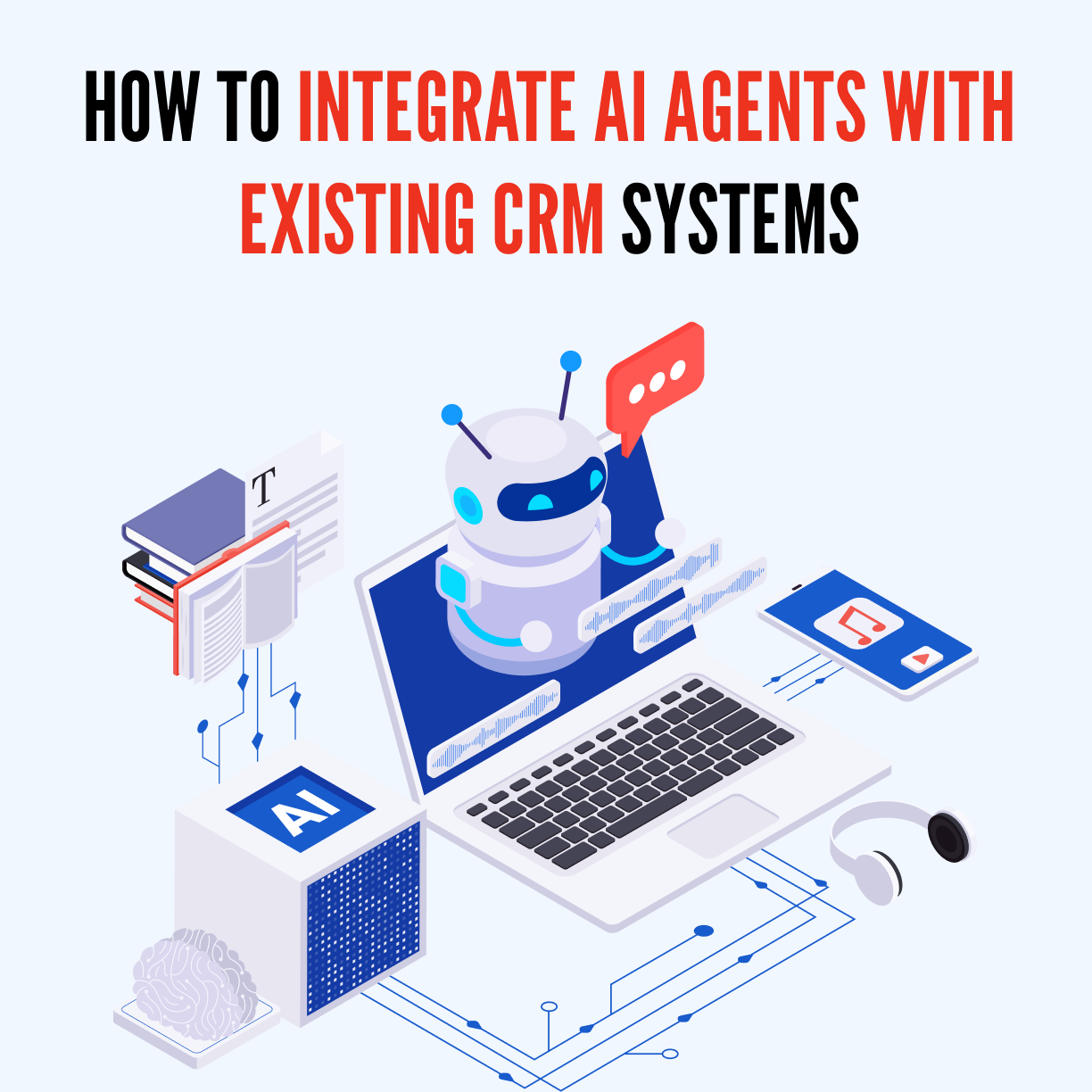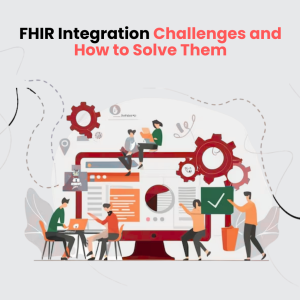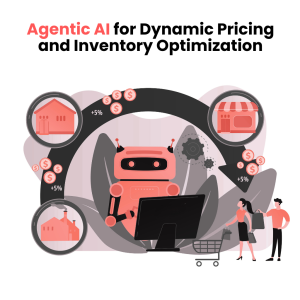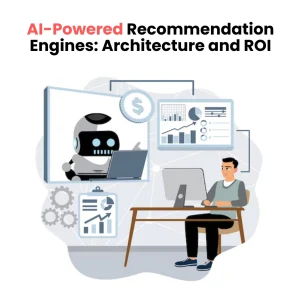As it stands, organisations are looking for innovative ways to improve their customer relationships, increase sales, and reduce their operating costs. Customer Relationship Management (CRM) systems and Artificial Intelligence (AI) agents are now integral parts of this competition vision. When combined, these two technologies unleash unparalleled potential, enhancing customer engagement automation, automating tedious processes, and enabling growth scales that were previously unimaginable.
With a single account, these CRM systems manage all forms of customer interaction, sales pipelines, marketing efforts, and support operations. AI agents form that extra layer of intelligence-they include chatbots, virtual assistants, and predictive analytics tools-furnishing automated answers, useful response patterns, and the highest personalization levels ever to browsing customers.
Gathering AI and CRM is now more than a novelty; it truly is turning into a necessity. Companies of all sorts across industries clearly see the improvement in productivity, the possibility to build deeper relationships with customers, and the advent of new ways to gain a competitive advantage that the AI-driven CRM can bring. Change toward AI customer management takes place rapidly because organisations are looking for smarter and more adaptive ways to serve clients.
This guide will take you through the essentials – how AI and CRM integration works, the benefits, challenges, and best practices. Let us see how this can be used by your business as a foundation to create meaningful and lasting customer value.
What is CRM and Why Is It Essential for Businesses?
Customer Relationship Management (CRM) is a term that describes both the software and the strategies involved in managing a company’s current and potential customers. It centralises customer information, tracks all interactions, has automatic workflows, and supports a more thorough analysis. CRM types of software are available for businesses’ varying needs; for example, sales CRMs (like Salesforce), customer-service-related CRMs (such as Zendesk), and marketing CRMs (for example, HubSpot).
The primary advantages of AI CRM solutions are as follows:
Centralised Customer Data: Collecting all customer accounts onto one platform makes operations less clunky, increases the circuit response time for rendering services, and allows faster, more informed strategic decisions in an emergency.
Deeper Customer Insights: The enhanced analytical capacity available allows companies to better understand the habits, preferences, and purchasing modes of their customers to improve the accuracy of marketing campaigns and increase customer satisfaction.
Automated Lead Management: CRMs perform sales work automation regarding lead scoring, nurturing, and pipeline management – all of which allow the sales department to be much better equipped to focus on leads and convert sales at a higher volume.
CRM, however, has become much more than just maintaining relations with customers. It is today the backbone of any organisation towards which marketing drives successful relationships to achieve customer loyalty and generate sustainable revenues into the future, all also leading to improved lifetime values. The strategic value of CRMs lies in their ability to convert sparse data into actionable insights for much better customer centricity in decision-making.
Are you unsure which CRM solution best fits your business needs? [Talk to our experts.]
What are AI Agents and Their Role in Customer Relationship Management?
AI agents, from smart virtual assistants to automated chatbots and data-based predictive models, emulate human capabilities with an idea to automate interactions on a massive scale. The power of these agents lies in high-end machine learning and NLP abilities to converse with customers naturally, intelligently, and contextually.
There are several ways AI assists with various CRM functionalities:
Automation of Routine Tasks: Mundane tasks like data entry, email follow-up, or answers to customer queries are taken over by AI agents so that human staff can use their time and capabilities for more strategic activities of higher value.
Customer Interactions Are Personalised: By scrutinising historical customer data, AI agents construct hyper-personalised messages, recommendations, and interventions tailored precisely to individual customer preferences and behaviours.
Predictive Analytics and Insights: AI agents leverage past data to project future customer behaviour to bolster sales forecasting and increase retention strategies and target marketing campaigns.
Use cases of AI in CRM systems include intelligent customer support chatbots to address customer enquiries around the clock, predictive sales assistants to qualify and nurture leads, and advanced analytical agents to identify customer trends to guide corporate strategy.
Considering AI agents for better CRM results? [Discuss your needs with our specialists.]
Steps to Integrate AI Agents with CRM System
To have successful CRM AI agent integration, there should be a structured and thoughtful process. Here are the detailed steps you’ll need to take:
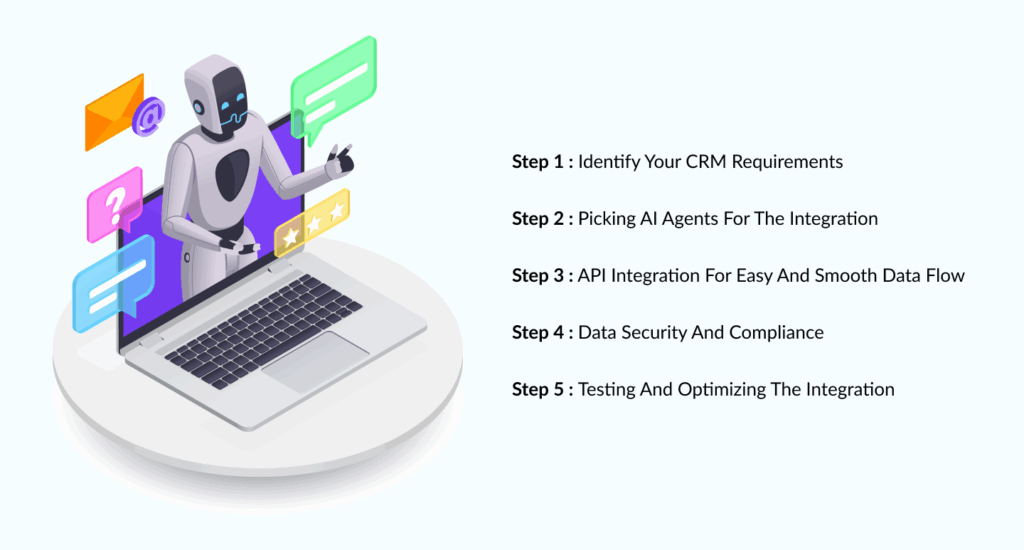
Step 1: Identify Your CRM Requirements
Begin with an assessment of the current CRM process and negative areas before AI agents can bring some good to it, like customer service automation, lead nurturing, and use of analytics on large amounts of data. Identify any operational holes that arise from things like manual data entry, delayed replies, or data blindness regarding customers, all of which AI can bridge.
Step 2: Picking AI Agents for the Integration
Pick any AI solution that fits the requirements of your CRM, keeping in mind these critical conditions:
Compatibility: Pick an AI technology compatible with your existing CRM infrastructure so there won’t be much deployment friction.
Scalability: Therein, go for an AI agent that will grow along with your business, bringing maximum growth possible with minimum additional investment and least disruption.
AI Model Selection: Here, AI models like Large Language Models (LLMs), NLP-driven chatbots, and predictive analytics engines should be considered, as those that can fulfil your business objectives should be shortlisted.
Step 3: API Integration for Easy and Smooth Data Flow
CRM AI agent integration underpins the connectivity between CRM and AI agents. APIs thus allow data to flow bi-directionally in real time, facilitating the real-time access and update of customer data by AI agents from and to the CRM in the most accurate way. Real-time synchronisation is necessary to ensure consistency and effectiveness when communicating with customers.
Step 4: Data Security and Compliance
We should always prioritise data privacy and security. Strong security arrangements, encryption standards, and access control should be put in place at all levels. Compliance with GDPR and all relevant privacy laws should be ensured to ensure customer confidence and legal conformity.
Step 5: Testing and Optimizing the Integration
Ensure pre-implementation testing of all aspects of the system, including functionality, usability, integration stability, and performance, ahead of widespread installation. Feedback loops should be implemented to catch relevant glitches early, continuously refine the human-AI interaction, and optimise the AI system to achieve the greatest efficiency and reliability.
Do you need guidance on how to seamlessly Integrate AI agents with CRM? [Get a tailored consultation.]
Benefits of Integrating AI Agents with CRM Systems
Companies that efficiently use AI in CRM systems can gain a striking competitive advantage:
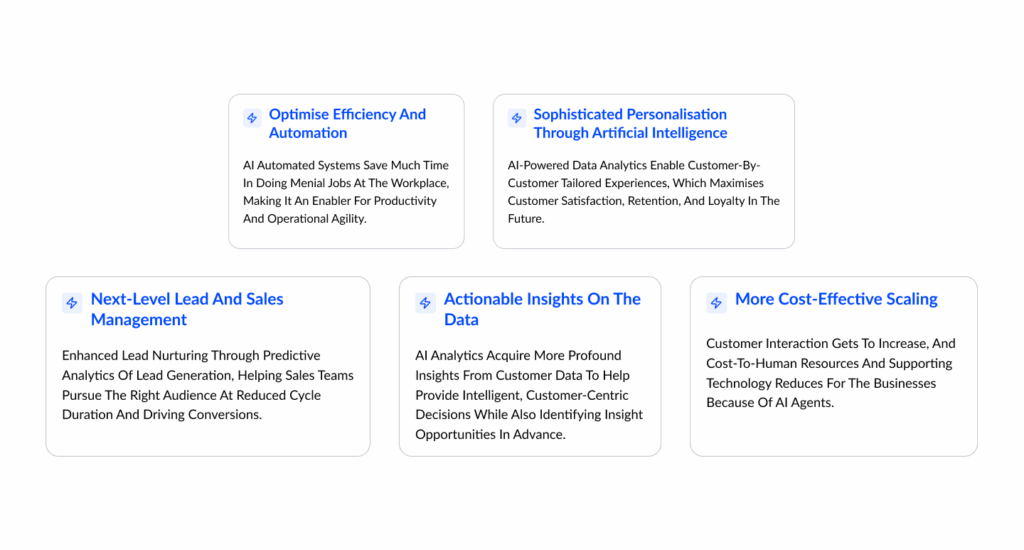
- Optimise Efficiency and Automation: AI automated systems save much time in doing menial jobs at the workplace, making it an enabler for productivity and operational agility.
- Sophisticated Personalisation through Artificial Intelligence: AI-powered data analytics enable customer-by-customer tailored experiences, which maximises customer satisfaction, retention, and loyalty in the future.
- Next-level Lead and Sales Management: Enhanced lead nurturing through predictive analytics of lead generation, helping sales teams pursue the right audience at reduced cycle duration and driving conversions.
- Actionable Insights on the Data: AI analytics acquire more profound insights from customer data to help provide intelligent, customer-centric decisions while also identifying insight opportunities in advance.
- More Cost-effective Scaling: Customer interaction gets to increase, and cost-to-human resources and supporting technology reduces for the businesses because of AI agents.
Curious how these benefits apply specifically to your business? [Talk to our experts.]
Challenges of Integrating AI Agents with CRM Systems
Despite the numerous benefits, organisations may face challenges when integrating AI with agents CRM systems.

- Compatibility Issues: Legacy CRM systems might require extensive upgrades or custom middleware solutions to facilitate seamless CRM AI agent integration.
- Data Overload Management: Businesses must manage vast amounts of data effectively, ensuring that AI agents process structured, relevant data rather than irrelevant or redundant information.
- Customisation Requirements: AI CRM solutions often require customisation to match unique business operations, demanding ongoing refinement and dedicated resources.
- Employee Training and Adoption: Properly training employees to leverage AI-driven CRM tools is critical. Staff must clearly understand AI roles, benefits, and operational changes to ensure effective adoption and use.
Facing challenges with AI integration? Let us simplify the process for you. [Consult our team.]
Best Practices for Integrating AI Agents into CRM Workflows
To maximise the potential of CRM integration with AI, adhere to the following proven best practices:
- Clearly Define AI’s Role:
- Assign AI agents to specific CRM areas like sales, support, or marketing. This creates focus, clear impact, and measurable results.
- Continuous Performance Monitoring:
- Regularly track AI agent performance against KPIs and customer satisfaction scores. Adjust and refine AI models based on real feedback.
- Leverage CRM Data for AI Training:
- Use historical CRM data to train AI agents effectively. This improves accuracy, personalisation, and predictive modelling.
- Regular Updates and Improvements:
- Keep AI models and integrations updated. Adapt them as customer needs and technologies evolve.
Want help implementing these best practices effectively? [Connect with our experts]
Real-World Examples of AI Agent & CRM Integration
Companies across sectors like retail, healthcare, and finance have achieved substantial benefits through CRM AI agent integration:
- Retail: Amazon’s CRM uses AI agents for hyper-personalised product recommendations, optimising customer experiences, and boosting sales.
- Healthcare: AI in CRM systems streamlines patient communications, improves scheduling efficiency, and delivers customised health recommendations.
- Finance: An AI-powered CRM enhances customer service with virtual assistants, automates risk assessments, and optimises financial product recommendations.
CRM platforms such as Salesforce Einstein, Zoho CRM, and HubSpot demonstrate seamless integration with AI, facilitating rapid deployment and substantial performance improvements.
Inspired by these examples? We can help you achieve similar results. [Speak with our team].
Tools and Technologies for Integrating AI Agents with CRM Systems
The correct selection of these integration tools and technology is essential for effectively integrating AI in CRM systems to enhance customer engagement and ensure efficient delivery.
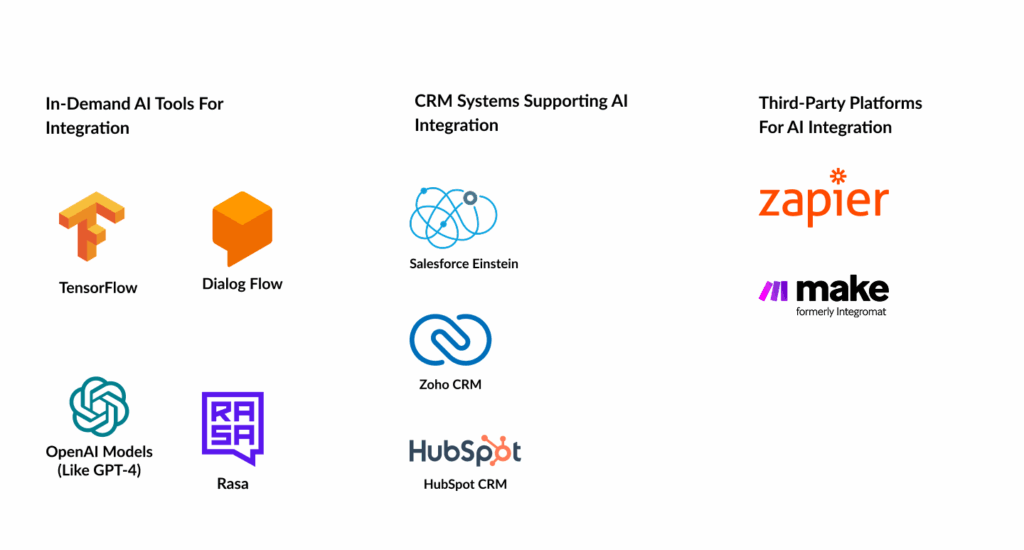
In-Demand AI Tools for Integration
- TensorFlow: Google’s mighty open-source machine-learning platform suitable for building predictive analytics and custom AI-driven CRM applications.
- Dialog Flow: Great for designing intuitive conversational chatbots and virtual agents to facilitate natural customer interaction.
- OpenAI Models (like GPT-4): Multi-purpose and intelligent conversational AI models super suitable for customer service automation and personalised recommendations.
- Rasa: Open-source conversational AI platform for secure, customised, and contextually aware virtual agents.
CRM Systems Supporting AI Integration
- Salesforce Einstein: AI tools for predictive analytics and intelligent automation, easy to integrate with third-party solutions and applications.
- Zoho CRM: Grants AI integrations alongside strong predictive analytics, automation capabilities, and flexible integrations.
- HubSpot CRM: User-friendly platform that seamlessly integrates with AI tools to optimise lead nurturing and engagement on a personal level.
Third-Party Platforms for AI Integration
- Zapier: It provides simple automation for synchronising data between AI tools and CRMs with minimal coding.
- Make (formerly Integromat): A powerful visual automation platform that allows for the seamless execution of complex CRM-AI integration workflows.
Ready to boost your CRM effectiveness with AI? [Contact us for personalized integration support.]
How Esferasoft Can Help You Seamlessly Integrate AI with Your CRM
We, at Esferasoft, develop personalised solutions for CRM integration with AI, specifically adapted to the requirements of your business. With high proficiency in AI technology and CRM platforms, our team is geared towards providing end-to-end solutions, starting with the initial consultation and strategic planning stages and continuing with deployment and optimisation thereafter.
Here’s what we can do for you:
- Customised AI Integration:
- We analyse your existing CRM workflows and identify operational gaps. Based on these insights, we design tailored AI-driven CRM solutions that boost efficiency and productivity.
- Expert Guidance:
- Our experts help you select the most suitable AI tools and CRM platforms. This ensures perfect compatibility and consistently high performance.
- Seamless API Integration:
- Our developers have extensive experience handling complex API setups. They enable real-time data synchronisation between your CRM system and AI agents for smooth, automated workflows.
- Security and Compliance:
- We prioritise data protection and follow strict security protocols. Every AI-integrated CRM solution aligns with GDPR and other major compliance standards.
- Continuous Support and Optimisation:
- After deployment, our team monitors and fine-tunes your AI agents. This ensures top performance, better customer experiences, and measurable business results.
Looking for expert support to integrate AI into your CRM effectively? [Talk to the Esferasoft team today!]
Access the Future: Propel Your CRM Strategy with AI Integration
Integrating AI agents with your current CRM system is not just an upgrade but a significant step forward. By employing intelligent automation, predictive analytics, and unmatched insights into customers, your business can lead and not only follow in a digitally driven marketplace.
Imagine a world where customer interactions can be easily personalised, leads are nurtured in almost a conversational manner, and decisions are made only on the basis of clear, data-based insights. This future is not a dream; it is a reality within reach—today!
Are you ready to reinvent CRM AI agent integration?
[Contact us today at +91 772-3000-038 for a bespoke AI-driven CRM solution designed especially for your business.]
